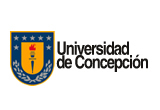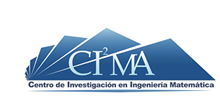Graduate Thesis of Ramiro Acevedo
 | Program | PhD in Applied Sciences with mention in Mathematical Engineering, Universidad de Concepción |
|---|---|---|
| Enrollment Year | 2004 | |
| Senior Year | 2008 | |
| Thesis Title | Finite Element Method for Induced Current Problems | |
Thesis Summary:In this thesis we analyze some problems of induced currents and the approximation of their solutions through the finite element method. Initially a formulation in terms of certain potentials of a problem of currents induced in harmonic regime in a bounded domain is studied. A rigorous mathematical analysis of said formulation is carried out in which it is shown that the corresponding variational formulation is a well presented problem. In addition, it is demonstrated that the discrete scheme that is obtained with usual subspaces of finite elements, converges optimally. Later, an evolutionary problem of induced currents is addressed, by means of a formulation that is obtained from the introduction of a temporal primitive of the electric field. This formulation allows to treat the case of ferromagnetic materials, whose relationship between intensity and magnetic induction is typically non-linear. The problem is covered in three progressive instances: linear problem in a bounded domain, nonlinear problem in a bounded domain, and linear problem in all space. The formulations obtained in the cases corresponding to a bounded domain have a mixed structure, where a Lagrange multiplier is used to impose the constraints of the electric field on the non-conductive material. It is demonstrated that these formulations are well presented and propose semi-discrete (in space) schemes based on Nédélec finite elements for the main variable and finite elements usual for the multiplier, and completely discrete schemes through the implicit Euler method. In addition, optimal estimates of the error of both schemes are shown. The formulation corresponding to the problem in the whole space allows to combine a mixed finite element method (like that of the bounded case) with a border elements method. This coupling is made by introducing a variable at the boundary of a certain bounded domain containing the regions of interest, which allows to approximate that variable with a subspace of usual finite elements on the boundary. In this case, results similar to those obtained in the bounded case are also deduced. | ||
| Thesis Director(s) | Salim Meddahi, Rodolfo Rodríguez | |
| Thesis Project Approval Date | 2006, April 05 | |
| Thesis Defense Date | 2008, September 10 | |
| Professional Monitoring | Since October 2001: Assistant Professor, Departamento de Matematicas, Facultad de Ciencias Naturales, Exactas y de la Educacion, Universidad del Cauca, Popayan, Colombia. | |
| PDF Thesis | Download Thesis PDF  | |
ISI Publications from the ThesisRamiro ACEVEDO, Salim MEDDAHI, Rodolfo RODRíGUEZ: An E-based mixed formulation for a time-dependent eddy current problem. Mathematics of Computation, vol. 78, 268, pp. 1929-1949, (2009) Ramiro ACEVEDO, Rodolfo RODRíGUEZ: Analysis of the A, V-A-ψ potential formulation for the eddy current problem in a bounded domain. Electronic Transactions on Numerical Analysis, vol. 26, pp. 270-284, (2007) |
||
<< Back to list of Graduate Thesis.

